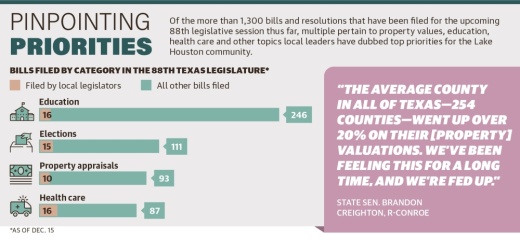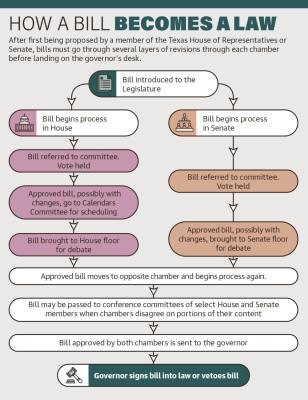More than 1,300 bills have been filed by members of the Texas House of Representatives and Senate to date, including just over 155 bills filed by lawmakers representing the Lake Houston, Humble and Kingwood areas.
Additionally, lawmakers will be tasked with approving the state’s budget during the session, which will finance spending through 2024 and 2025. During a Nov. 23 event held in Austin, State Comptroller Glenn Hegar said lawmakers will have a surplus exceeding $27 billion to work with as they head into budget negotiations.
Incoming Rep. Charles Cunningham, R-Houston—who was elected in November following the retirement of Rep. Dan Huberty—said the budget surplus could open up a lot of possibilities for lawmakers.
“I’ve been told it’s easier to go through a session when you have no money because it’s easier to say, ‘no,’” Cunningham said, listing public education, mental health initiatives and property tax relief among his priorities. “You’ve got a laundry list of items that we’re going to be hitting. ... It’s going to be an interesting session.”
While the budget discussions will affect Texans throughout the state, many of the bills filed by local lawmakers are being written with the area’s needs in mind, including property tax relief, health care and education.
Property appraisal proposals
Several local lawmakers have filed bills aimed at lowering the amount appraisals on property values can rise each year. In Harris County, home prices saw an average value increase of 21% from 2021-22, according to the Harris County Appraisal District.
At an Oct. 5 Greater East Montgomery County Chamber of Commerce luncheon in New Caney, state Sen. Brandon Creighton, R-Conroe, said addressing rising property values will be a top priority in the 2023 legislative session.
“The average county in all of Texas—254 counties—went up over 20% on their [property] valuations,” Creighton said. “We’ve been feeling this for a long time, and we’re fed up.”
According to Texas tax code, the annual increase of a home’s appraised property value is capped at the sum of 10% of the home’s appraised value for the preceding tax year, the home’s appraised value for the preceding tax year and the market value of all new improvements to the property since it was last appraised.
However, Creighton said any bill aimed at lowering the state’s appraisal cap on property values would require a supermajority vote in each chamber.
“We’ve been pushing for a lower appraisal cap ... every single session [since 2005],” Creighton said. “That tells you how hard it is to get a bill passed, even in that environment in the Texas Capitol.”
Locally, lawmakers have filed 10 bills related to residential and commercial property value appraisals. House Bill 664—authored by Rep. Ernest Bailes, R-Shepherd—would lower the appraisal cap to 2.5%. House Bill 335—filed by Rep. Cecil Bell, R-Magnolia—would lower the appraisal cap to 5%.
Additionally, House bills 808, 809 and 810—filed by Rep. Will Metcalf, R-Conroe—would require chief appraisers, boards of directors and appraisal review board members for each county’s appraisal districts to be elected instead of appointed.
Health care bills
Sixteen of the 158 bills filed by local legislators are centered around health care with several bills calling for expanded access to Medicaid, which offers health insurance coverage for children, low-income residents and individuals with disabilities.
Data provided by the 2021 U.S. Census Bureau American Community Survey shows about 21.1% of Harris County residents did not have health insurance when polled.
According to Luis Figueroa, chief of legislative affairs for public policy advocacy group Every Texan, the state’s refusal to expand Medicaid eligibility stipulated by the federal Affordable Care Act approved in 2014 has contributed to a statewide uninsured rate of nearly 18%.
Figueroa said he believes the Affordable Care Act was largely successful in increasing access to health insurance by expanding Medicaid eligibility to include residents earning up to 138% of the poverty level. However, Texas opted out of the expansion, meaning nondisabled adults without children who are minors are ineligible for Medicaid regardless of their income.
“Most of the states have done Medicaid expansion ... because the [federal government] will put in 90% of [the funding], and the states put in 10%,” Figueroa said. “It’s a net benefit to the state because we get all this federal funding that will help shore up rural hospitals; it’ll reduce the uninsured rate, and it will provide an economic boon for a lot of communities.”
Senate Bill 125—authored in part by Sen. John Whitmire, D-Houston, and Sen. Carol Alvarado, D-Houston—would expand Medicaid eligibility to be in line with the Affordable Care Act.
In the Texas House, Rep. Senfronia Thompson, D-Houston, filed House Bill 487, which would expand Medicaid eligibility for women following a pregnancy from six to 12 months.
Education priorities
While there have been 16 bills filed by local legislators related to primary and higher education, Bob Popinski—senior director of policy for Raise Your Hand Texas, a nonprofit aimed at strengthening public education—said some funding issues could be addressed in the state’s budget.
“In 2019 ... we added $500 to our per-pupil spending, which was historic, but we are still $4,000 behind the national average,” Popinski said.
Humble ISD Superintendent Elizabeth Fagen listed several priorities she hoped lawmakers would address in the upcoming session, including enhanced mental health support, fully funded virtual learning, faculty retention and a re-examination the state’s A-F Accountability Rating System.
Fagen said she believes the rating system—which assesses schools and school districts based on state test scores; graduation rates; and college, career and military readiness outcomes—does not provide an accurate reflection of student outcomes.
“I understand that [the Texas Education Agency] says the goal is to create growth and stretch goals for districts and for the state, but a moving target makes no sense to anyone,” Fagen said. “A-F should be a criterion-based system with quality benchmarks, and if you meet them, you get the A or the B associated with clear and concise outcomes.”
Of the 16 bills that have been filed by local legislators related to education, none addressed the state’s accountability rating system.
However, House Bill 37—authored by Rep. Mary Gonzalez, D-Clint—would establish a 19-member commission to develop and make recommendations for improvements to the accountability rating system.
“Parents want all children to grow in reading, all children to grow in math, all children to develop soft skills like creativity and collaboration,” Fagen said. “Why can’t the A-F system be something similar?”
Emily Lincke contributed to this report.








